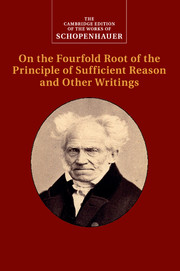Book contents
- Frontmatter
- Contents
- General Editor’s Preface
- Editorial Notes and References
- Introduction
- Notes on Text and Translation
- Chronology
- Bibliography
- Collation of the Two Editions of On the Fourfold Root
- 1 On the Fourfold Root of the Principle of Sufficient Reason
- 2 On Vision and Colours
- 3 On Will in Nature
- Glossary of Names
- Index
Reference to Ethics
Published online by Cambridge University Press: 30 June 2022
- Frontmatter
- Contents
- General Editor’s Preface
- Editorial Notes and References
- Introduction
- Notes on Text and Translation
- Chronology
- Bibliography
- Collation of the Two Editions of On the Fourfold Root
- 1 On the Fourfold Root of the Principle of Sufficient Reason
- 2 On Vision and Colours
- 3 On Will in Nature
- Glossary of Names
- Index
Summary
For reasons given at the beginning, corroborations of the remaining parts of my theory are excluded from the present task. However in the conclusion, I may be permitted a rather general reference to ethics.
Since long ago all peoples have recognized that the world, apart from its physical meaning, also has a moral one. Yet everywhere the matter has only come to a vague consciousness, which, as it sought expression, clothed itself in all sorts of images and myths. These are religions. For their part, philosophers have at all times taken the trouble to achieve a clear understanding of the matter, and all of their systems, with the exception of the strictly materialistic ones, agree, despite all their other differences, that what is most important, indeed, what alone is essential in all of existence, that on which everything depends, the actual meaning, the turning point, the point of it all (if I may say so) lies in the morality of human action. But concerning the sense of this, concerning the ways and means, concerning the possibility of the matter, they are all greatly at variance and face a dark abyss. From this it follows that moral-preaching is easy, moral-grounding difficult. Precisely because this point is established through conscience, it becomes the touchstone of systems, since it is justly demanded of metaphysics that it be the support of ethics, and now the difficult problem arises of demonstrating, contrary to all experience, that the physical order of things is dependent on a moral order, of discovering a connection between a force, effective according to eternal natural laws, a force that imparts stability to the world and morality in the human breast. Thus here even the best are frustrated: Spinoza now and then tacks a doctrine of virtue onto his fatalistic pantheism by means of sophisms, but more often than not he leaves morality completely in the lurch. After theoretical reason is at an end, Kant has his categorical imperative, cobbled together out ofmere concepts, appear as Deus ex machina with an absolute ought, the mistake of which became quite clear when Fichte, who always took overbidding for outdoing, spun the same imperative into a complete system of moral fatalism with Christian–Wolffian prolixity and tediousness in his System of Moral Philosophya and then presented it more briefly in his last pamphlet, The Science of Knowledge in General Outline, 1810.
- Type
- Chapter
- Information
- Schopenhauer: On the Fourfold Root of the Principle of Sufficient Reason and Other Writings , pp. 441 - 446Publisher: Cambridge University PressPrint publication year: 2012



